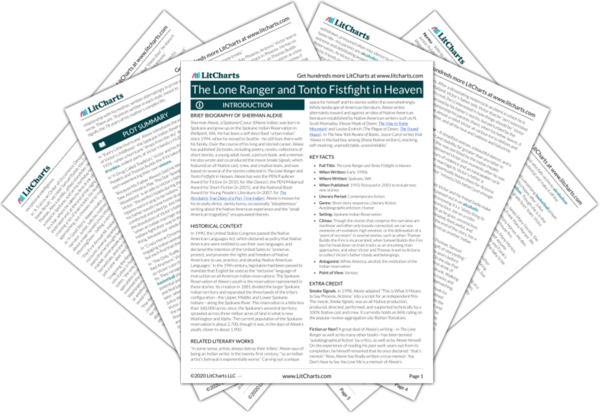Summary
Analysis
On a hot summer day, Victor and his friend Adrian, seated on Victor’s front porch, play around with a BB gun and drink Diet Pepsis, since they “don’t drink” anymore. They look out at the reservation, and notice that the “only” traffic light on the reservation does not work anymore.
The broken traffic light is a symbol of the stagnant feeling of the reservation; life there never seems to change in any significant way, and cycles of violence, poverty, and loss come around again and again.
Themes
A group of Indian boys walk by, looking to Victor like they are “off to cause trouble somewhere.” Adrian recognizes one of the boys as Julius Windmaker—“the best basketball player on the reservation though he [is] only fifteen.” Victor and Adrian remark that Julius looks good, and that he must not be drinking—yet. Victor describes Julius as “the latest in a long line of reservation basketball heroes,” and says that he has a gift.
Victor still feels the “ache” of his own “lost edge” as a basketball star. He asks Adrian whether he thinks Julius will be able to “make it all the way.” Adrian replies, “Maybe.” In the distance, they hear the group of boys breaking glass in the distance. A tribal cop drives by and then, a few minutes later, loops around, this time with Julius in the backseat, caught throwing a brick through a tribal council truck’s windshield. Adrian tells Victor that he thinks Julius is going to “go bad.” Victor insists that Julius is just messing around, testing his limits, being a kid. “Ain’t no children on a reservation,” Adrian says.
Because Adrian and Victor, who are only barely acquainted with Julius, have such high hopes for him, it’s safe to assume that several other members of the tribe and of Julius’s family have similar hopes for his success as a basketball star. Julius, however, is already demonstrating a restlessness and a defiance that are not just childlike willfulness. Adrian knows that childhood is a luxury, one that even Julius cannot afford.
Themes
One year later, Adrian and Victor sit “on the same porch in the same chairs.”They see Julius Windmaker “staggering” down the road, “drunk as a skunk.” Adrian and Victor know that Julius has a basketball game that evening, and they muse aloud about whether or not he’ll sober up in time to make it.
Despite being able to see clearly that Julius is an alcoholic, Victor and Adrian continue to hope against hope for his success.
Themes
Get the entire Lone Ranger and Tonto Fistfight in Heaven LitChart as a printable PDF.

Later that night, Adrian and Victor go to watch Julius play in his basketball game, but he is not “the ball player [they] remembered or expected.” He plays poorly, missing several shots, and eventually benches himself. Back on Victor’s porch after the game, Adrian and Victor drink Pepsis and Adrian notices that the traffic light is still broken. The two of them decide to go out, and leave Victor’s front door open “just a little, in case some crazy Indian need[s] a place to sleep.” In the morning, Julius is passed out drunk on Victor’s living room floor. Adrian throws a blanket over him, and he and Victor let him sleep.
A year later, the traffic light has not changed, and neither, really, have the circumstances of Adrian, Victor, or Julius—except that Julius is no longer able to provide Victor and Adrian with the vicarious hope they’d once shared. Though Victor and Adrian care for him in his time of need, they do nothing to intervene or to break the cycle of alcoholism and shattered dreams, just as no one seems able or willing to fix the traffic light.
Themes
Out on the porch, Victor and Adrian watch another group of Indian children walk by, “all holding basketballs.” They recognize one child as a girl named Lucy, a “little warrior” who plays for the sixth grade boys team though she herself is only in third grade. Victor tells Adrian that he hopes she “makes it all the way.”
Victor and Adrian’s selection of a new young basketball star to pin their hopes on mirrors the constant state of brokenness of the traffic light. Their behavior is cyclical and unchanging, and readers are left with the impression that the cycle will repeat forever.
Themes












